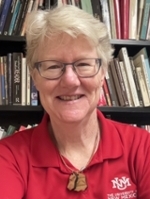Kathy McKnight

Professor
Email: mcknight@unm.edu
Phone: 505-277-5907
Office: Room 419 Ortega Hall
Personal Website
Education:
PhD, Stanford University, 1992
Research Interests:
Early Modern Literature & Culture , Women's Agency, Afro-Hispanic Documentary Narratives , Health Humanities
Research Statement:
Profile:
I am a scholar of Latin American colonial discourses and a passionate teacher of language, cultures, literatures, and cultural studies. These professional interests were sparked by living in South Africa as the daughter of educators, as an adolescent in small-town Indiana, and as a student of Latin America, activism, and Peace and Global Studies at Earlham College.
Studying the discourses of colonialism for me means asking:
How did we come to these violent, messy, and vibrant relationships?
How might we see that distant colonial world and our own in new ways by analyzing the words and signifying practices of colonizers and colonized?
Most recently, I have turned to Health Humanities as a way to engage future health professionals in humanistic study. I co-authored with Jill S. Kuhnheim the Open Educational Resource, Para vivir con salud. Leyendo la salud y la literatura (2021). This text introduces students to the relationship between close reading, close listening, compassion, and equitable professional relationships.
My work also appears in the Colonial Latin American Review, the Journal of Colonialism and Colonial History, the Colonial Latin American Historical Review, and Revista de Estudios Hispánicos.
Recent/Select Publications:
My book The Mystic of Tunja. The Writings of Madre Castillo, 1671-1742 (1997) explores how one woman molded autobiographical discourse, while facing both the empowerment and the constraints of the Church.
The book won the MLA’s Katherine Singer Kovacs Prize.
Afro-Latino Voices: Narratives from the Early Modern Ibero-Atlantic World, 1550-1812 (2009), coedited with Leo J. Garofalo, brings together the testimonies, letters, wills, dialogues, and autobiographical narratives of Africans and their descendants in the first collection of its kind. It returns these voices to the discursive contexts from they have been erased, and through which we understand early-modern peoples and how they wrote and spoke about their interwoven lives.
